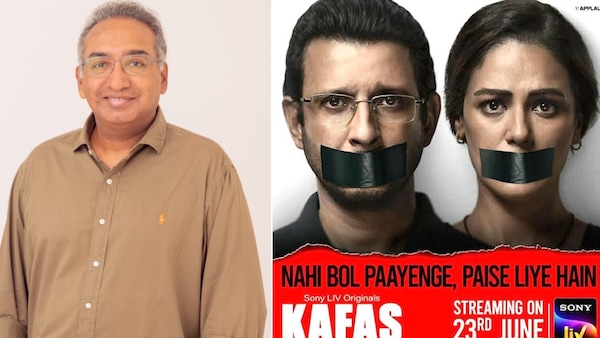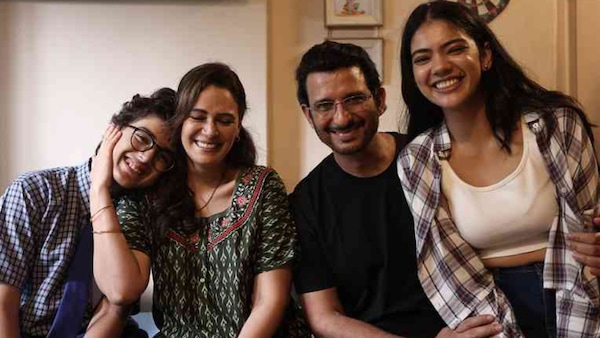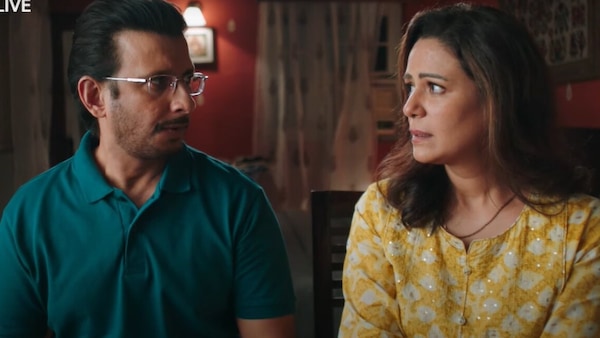Kafas producer Sameer Nair on OTT content: ‘We need to be more adventurous; have a risk-taking appetite’ | Exclusive
Kafas - backed by producer Sameer Nair - is streaming on SonyLIV

Sameer Nair - Managing Director of Applause Entertainment
Last Updated: 11.55 AM, Jul 08, 2023
Streaming on SonyLIV, writer-producer Sahil Sangha’s latest directorial venture Kafas is being widely appreciated. Starring Sharman Joshi, Mona Singh, Mikhail Gandhi and Vivan Bhatena, among others, the six-episode crime drama series is a ‘a gripping tale of power and privilege trampling over truth and justice’.
Inspired by the 2019 British miniseries Dark Money, Kafas focuses on the journey of a middle-class family that ‘rejoices when their son acquires a once-in-a-lifetime career opportunity, until a haunting reality hits them, leaving them to navigate the grounds of morality and power’.
Sameer Nair, the producer of Kafas and Managing Director of Applause Entertainment, recently engaged in an exclusive interview with OTTplay. Sameer - who is known to have been one of the creative minds behind the revamp of a number of television networks as well as part of the launch of shows like Kaun Banega Crorepati and Balaji Telefilms’ soap operas on Star Plus - spoke about the making of Kafas, his take on relatable content on OTT, the possible impact of AI on streaming services and more. Excerpts:
Q. What makes Kafas special for you? It’s a sensitive yet powerful topic for a web series. What made you support this project?
A. When we first saw the original show, Dark Money [a 2019 British miniseries directed by Lewis Arnold], we were immediately drawn to it first because of the uniqueness of the story and second, because it was a universal emotion about a middle-class family that was in this dilemma of whether they should back their morals or accept the money. That is such a real everyday common story, where middle-class people often find themselves in - these difficult situations, where there is either truth and honesty and integrity or there is money.
Because it was also set in the entertainment industry, and we have such a big entertainment industry, we thought that this story could be very well reimagined for India. That’s why we got Sahil on board, and we started working and developing the show for the Indian audience. The reason it’s done so well is because it’s purely a drama. We handled the real sensitive part of the story. We’ve kept to the bare minimum, and focused on the familial drama and the trauma that is created. We knew it was going to be a great story to tell, and we are really happy that the audiences have also seen it in that light.
Q. Tell us about the response from the audience - in terms of the narrative and the ensemble cast..
A. At this point, I think we are really happy. We are glad that the audience liked the cast, because it’s been put together in a very interesting combination. And a lot of that credit must go to Mukesh Chhabra, because he’s the one who suggested Sharman in the first place. He said that Sharman would be perfect for the role of the father who’s caught in this moral dilemma. We all know Mona Singh. Then, there’s Mona Vasu, who’s a find from the past. We have worked with her before, but it was great fun to get her back.
The kids are wonderful. Mikhail Gandhi, we worked with before, but Vivan Bhatena is the real surprise in this story. I think actually the cast came together really well. They’re all strong performers; good actors. They have a certain degree of familiarity, but many of them have not been seen for some time. I think the package came together very well. I think what people have liked the most is this middle-class story of people like us, basically.
People like us who are suddenly faced with an indecent proposal, and how do they react to it. I think there’s been a good response. We’ve got a lot of social reaction to it. Again, Sony did a wonderful marketing campaign. The way they chose to market the show helped a lot. They never gave out anything; didn’t tell anyone what this was about. It was just that campaign with Sharman and Mona with their mouths taped up. When people start watching the show, it goes along so quickly that you finish watching six episodes in one shot. And it’s quite a ride. I think it worked out well.
Meanwhile, the title of the series also fits accurately. Kafas means a cage or to be caged, and that is exactly the position the family finds themselves in. After they discover what has happened, they are suddenly put in this cage, which is like a gilded cage; a golden cage. They’re given so much money, and then asked to keep their mouth shut. That’s how the story plays out.
Q. You mentioned people preferring to watch relatable stories on screen now. Why do you think that is happening?
A. I think it will be a combination of many things. If you take TV as a contrast, it has been dominated by the saas-bahu serials and the reality shows. And that didn’t leave much space to tell other kinds of stories. A lot of the movies, on the other hand, have tended to be larger than life. Therefore, many times things are quite unbelievable, because they were the larger experiences. Premium television, as we call it, was not the saas-bahu show and not even the big over-the-top action adventure movies. A lot of these stories that we got a chance to tell on OTT have been these stories. I think all the credit goes to the Indian creative community that has collectively managed to tell many such good stories. Applause Entertainment has its fair share, but I would think all our fellow creators have done that. There are so many wonderful stories that have been told over the past six-eight years, across languages. I think the audience has really been exposed to good content.
Of course, big action films and similar stuff are going to be around. But by and large, there are different types of stories. I think OTT as a medium is allowing us to experiment with different genres, different milieus, with just eight-ten episodes. So, it’s not like a long-running soap or a big movie that has to be released theatrically and, therefore, requires a starry cast. We are now able to tell very interesting, unique stories and also able to cast these projects well. We’re able to bring back some stars from the past as well as find new faces. We are now essentially creating a new idiom of storytelling, and I think the audience is liking that, because they’ve never seen anything like that before.
In the West, this has been going on for the past 20-30 years. But for India, this is completely new. I think it’s been delayed. We never had our HBO moment, like how HBO happened in the 80s and 90s. But now, it has happened. I think that’s the reason there is so much good work being done and audiences are liking them so much.

Q. You’re somebody who has seen the transition from movies to television to prime time and now OTT. How do you perceive the future of the digital medium?
A. Honestly, the whole streaming business is quite young. If TV as an industry in India is say 30 years of satellite television and say another 20 years of terrestrial television before that, and in the US, even longer, say another 20-30 years more. Streaming in that sense is relatively new. It’s about 10-12 years of real solid streaming. It’s at a nascent stage, which has not even completed its first generation, so to say. I think that this is only going to grow, because devices have grown. Everyone has smartphones and smart TVs, and smart TVs are in fact going to go even bigger.
Connectivity is there. We’ve already got 4G and soon there’s going to be 5G everywhere. The cost of both connectivity and devices has become so cheap. This has now created an opportunity to build a new audience, consuming a new story. It’s more individual; more ‘me time’ rather than the family viewing TV. This is just the start. I think this is going to get bigger and brighter and better, and we’re going to tell many more stories. I think we’re going to do it in a much smarter way.
Today on OTT, you can see movies and shows in different languages - English, Hindi, Tamil, Telugu and more - all on the same platform next to each other. That was never possible with TV. Now it’s possible with streamers and not with just one, with all of them. This is available to you all the time. I think that’s revolutionary. I think it’s also making us change as audiences. We are becoming more discerning, appreciative and understanding. We are not just stuck with indie shows. Now, audiences are actively consuming all kinds of content from everywhere in the world.
Q. What, according to you, are the major factors that are working in favour of OTT at this point, and what are the areas that, you think, need improvement?
A. I think as far as storytelling goes, as long as we keep telling good stories and keep focusing on our craft (writing, casting and production), and we do that very diligently and meticulously, I think that part of the business will always grow and we’ll keep doing better things. As the market expands, as the platforms get more subscribers and users, they will have more profitable businesses and that will then energise the whole business to grow. Those are really the two important things that we require to do.
We must be more conscious creators and the platforms need to be more profitable businesses. That’s pretty straightforward. I think what can be done better is I think we can collectively be more adventurous. We must take more risks. While, of course, there is a formula that must be followed. People love formulas, which is why they love the saas-bahu shows. And which is why, they also love crime dramas, because that is something that everyone likes. I still think we have to have a risk-taking appetite to put out all kinds of content there and give that a chance.
Otherwise, I suppose the market could run the risk of just doing too much of the same thing and then collapsing on itself. I think that the need for variety in entertainment and in content is very important. As long as that’s there, what it does is that it keeps the service fresh and the audience excited and looking for more. Globally, they do that. Sometimes, you see the material coming out on Netflix and Amazon Prime Video is quite distinctive. Even Apple TV+, they do such amazing, different things. I just hope that in India, we are able to do the same.
Q. Currently, generative artificial intelligence (AI) is creating quite the buzz globally. How do you think it’s going to impact the entertainment industry, particularly in terms of the digital space?A. Well, AI has been in our life already for the past 10-15 years. Because when you take your smartphone, that is AI at work; when you take Alexa and things like those, that is AI at work; your computer itself, Google and Zoom calls - these are all different kinds of technology at work. What the newly found AI is doing and the ones that everyone’s talking about is able to remarkably create things out of seemingly nowhere, which is not true because it is essentially searching the net and looking at a million examples and then putting together something, which a human being could anyway do by searching the net.

The only thing is that the machines are doing it faster and quicker. But I think currently, the way AI is is still coming out of our collective experiences. That’s what is creating new ideas, new images and new thoughts. It’s a very useful device, a useful tool. I think like with all things technology, human beings will use this tool and use it to their advantage to do things better. Oftentimes, AI and a lot of this technology does is that it takes away mundane tasks from us and, therefore, leaves us with more time to do even more creative things. I hope that as technology improves, it takes away the boring routine tasks from human beings and leaves us to create even better things. Let’s see.
Q. What are you watching on OTT currently?
A. I came late to the party on this show on Apple TV+, called Severance. I just started watching it and it’s quite freaky. It’s a science fiction show of some kind as in the dystopian future. It’s nice.
I also recently rediscovered this cult iconic comedy, called 30 Rock, on JioCinema. It used to be on NBC. That’s a really fantastic comedy. I highly recommend it, everyone should watch it. I’m watching it for the sixth or seventh time, but even then I think it’s really good.
I just finished watching Scoop and Jubilee. They are really good. Then, there is City of Dreams Season 3. That’s our show.
Q. Any future projects that you would like to mention?
A. Well, we are currently hard at work on getting our dream project, Gandhi, started. The team has just finished the records, and we’ll soon go into production. So, that’s a big one for us. It’s being directed by Hansal Mehta, and the cast includes Pratik Gandhi. It’s a very good set up. We are excited about it.
Also in the works is the second season of Tanav, which we will be shooting in Kashmir in September-October. That’s going on. Apart from that, we are working on City of Dreams 4 and Criminal Justice 4. There’s a whole bunch of other new shows being made. Lots of stuff happening. Our Tamil movie - Por Thozhil - released in June 2023, and became a big hit. We are really grateful for that. That was a happy surprise for us. These are some of the things going on.

